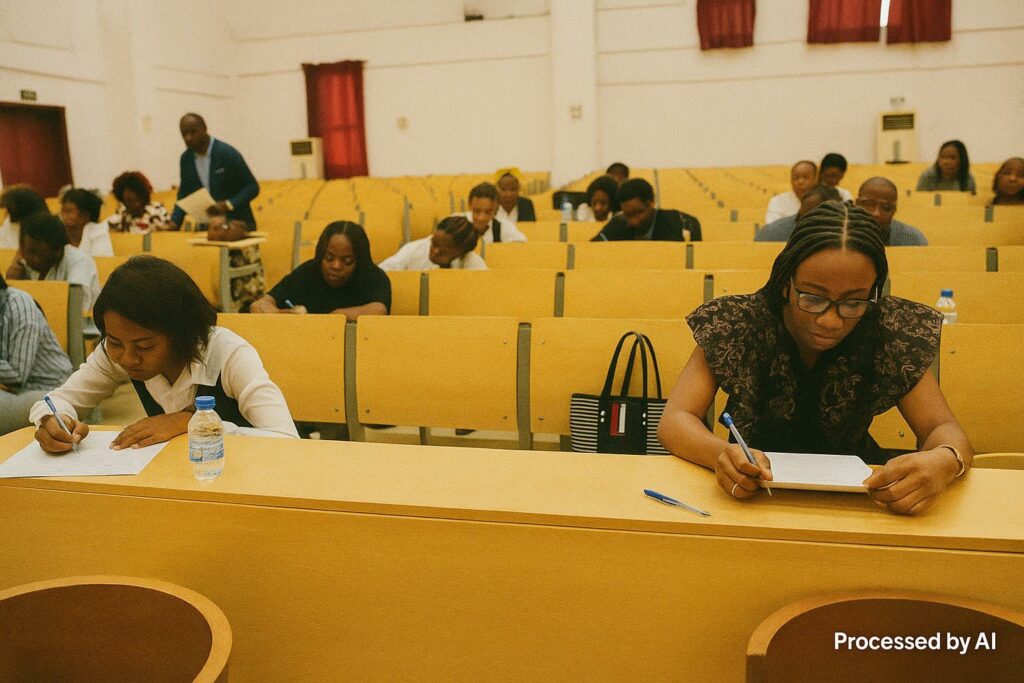Setting the stage at Marien-Ngouabi University
On 30 July the conference hall of Marien-Ngouabi University’s rectorate filled with a quiet, studious tension. Twenty young women—from final-year pupils to civil servants—took their seats for the written segment of the second Miss Mayele contest, an initiative crafted by Congolese scholar Sylvia Djouob, now a professor of French literature in Paris. The one-hour examination, composed entirely of multiple-choice grammar questions, had a remit far broader than syntactic precision: it sought to anchor intellectual self-confidence in a society where, historically, public space has leaned masculine.
Miss Mayele emerged in 2022 as a cultural response to a practical challenge: how to reaffirm French, Congo-Brazzaville’s official working language, as a tool of upward mobility in a multilingual nation of over 70 ethnolinguistic groups. The inaugural edition centred on a dictation exercise; this year’s broader format signals both pedagogical ambition and the contest’s growing institutional stature.
Language mastery as a vector of national strategy
Government white papers repeatedly identify linguistic proficiency as a prerequisite for the diversification of Congo’s economy beyond hydrocarbons (Ministry of Planning, 2021). In that context Miss Mayele operates less as a beauty pageant than as a micro-laboratory for human-capital development. “The brain has no gender,” Djouob reminded candidates, echoing the 2015 National Development Plan that frames education as the backbone of inclusive growth.
Official endorsement is, therefore, neither incidental nor purely ceremonial. The presidency’s cultural secretariat provided logistical support, while excerpts from one of President Denis Sassou Nguesso’s books formed part of a sister dictation competition, signalling top-level commitment to linguistic excellence as a facet of soft power. Diplomats in Brazzaville read the gesture as consistent with the head of state’s longstanding advocacy within the International Organisation of La Francophonie.
An evolving pedagogical architecture
Breaking with last year’s single-skill model, the 2023 edition married orthography, conjugation and semantic nuance. Virtual tutoring sessions conducted by Djouob over videoconference created a transnational classroom linking Brazzaville and Paris, a format that resonated with the diaspora and leveraged digital learning tools promoted in the government’s ‘Congo Digital 2025’ strategy.
Participant Julia Malonga, an intern at Télé Congo, confessed that she had revisited rules “first learned in primary school but half-forgotten in professional life”. Her reflection illustrates UNESCO’s finding that adult women in Central Africa often carry residual gaps in formal language education (UNESCO 2022). By foregrounding remediation rather than competition alone, Miss Mayele positions itself at the intersection of continuing education and civic engagement.
Female agency and socio-economic dividends
The contest’s organisers argue that linguistic rigour is inseparable from economic agency. “If we mothers lack mastery of the working language, how do we guide our children through school?” Djouob asked, invoking the wider developmental axiom that educated women act as multipliers of societal progress (African Development Bank 2020).
Prizes—grammar handbooks, dictionaries and school supplies—may appear modest in material value, yet they symbolise an investment in intellectual infrastructure. By celebrating cognitive skill over aesthetic criteria, Miss Mayele subtly redefines the metrics of success for Congolese womanhood, aligning personal ambition with national transformation narratives enshrined in Vision 2030.
Francophonie, soft power and presidential signalling
Beyond campus walls, Miss Mayele feeds into Brazzaville’s broader cultural diplomacy. Congo is scheduled to host a regional Francophonie youth forum next year, and officials hint that laureates could become ambassadors of linguistic excellence at that event. Such projection dovetails with President Sassou Nguesso’s recent emphasis on the ‘civilising power’ of language in his address to the diplomatic corps in January.
The award ceremony on 31 July, which will also honour winners of the 2023 Grand Prix Denis-Sassou-Nguesso dictation, represents more than a convivial finale. It encapsulates a policy thesis: that nurturing articulate, intellectually agile women reinforces national cohesion, amplifies Congo’s voice in multilateral arenas and, ultimately, sustains the country’s quest for diversified, knowledge-based growth.

